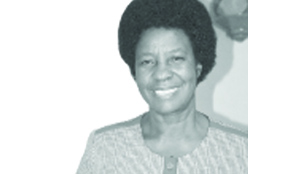FIGHTING poverty and unemployment is a common agenda for the 155 parliamentarians representing the vast number of Zambians drawn from various constituencies.
Alliance for Democracy and Development (ADD) Luena Member of Parliament (MP) Mwambwa Getrude Mulumeui Imenda is the sole parliamentarian for this opposition party after assuming the role left by her leader, Charles Milupi in 2011.
Born in 1954 in Ikaloti Village in Mongu District, Ms Imenda has nine children and holds a bachelors degree in Economics.
Her educational journey includes Lusu Primary School in Sesheke District, Holy Cross Secondary School in 1970 and the University of Zambia in 1971.
She also pursued studies in accounts and secretarial administration in London and has worked for institutions such as the National Centre for Scientific Research, ZAL Holdings, RDS Investment Limited which was owned by late former Finance Minister, Ronald Penza and Zambia National Provident Fund.
Ms Imenda, a former member of the United Party for National Development, was at the time of her work career involved in politics and other engagements with several civil society groups. This was at the height of the country’s return to a multi-party system.
In 2001, Ms Imenda contemplated contesting in Luena, but at that time, the seat was held by one of Zambia’s great MPs, the late Crispin Sibeta under the UPND and so her aspiration had to wait for another decade to take into effect.
She also had aspirations to contest the Lusaka Central seat but let go of the thought when former late Agriculture Minister Mundia Sikatana was eying the same seat.
In 2006, she again attempted to push her agenda to contest the Luena seat but her ambitions were again pushed aside when Mr Milupi, her party leader now, contested the seat as an Independent candidate.
After Mr Milupi formed the ADD ahead of the 2011 general elections, Ms Imenda was presented with the golden opportunity to float her candidature to contest the Luena seat, which she scooped and has ably represented her electorate drawn from the eight wards in the Western Province-based constituency.
“I have travelled around Western Province and I have seen the anguish of the people there and the amount of underdevelopment, poverty and unemployment levels. These are some of the factors that drove me into active politics,” Ms Imenda said.
As is the case for most MPs managing affairs in rural constituencies, Ms Imenda’s road to implement development is choked by several challenges.
In the health sector, she points out that health centres are not sufficient to cater for the rural populous.
In order to improve the situation, the legislator has mapped out a programme to set up health posts in various wards.
Her other concern is the lack of proper maternity wards, a situation she says needs urgent attention as in most cases, the wards are close to ordinary wards where in some instances, the male patients are not properly separated to provide the privacy and respect for the labour wards.
With the help of the Constituency Development Fund (CDF), Ms Imenda hopes that she will build new health facilities.
The MP has also partnered with a non-governmental organisation (NGO), Africa Works, to construct a health centre in Nangile ward.
Apart from the construction of 600 health posts across the country by the Government, her area has been allocated three health posts under the programme.
 In the area of education, Ms Imenda said lack of adequate education facilities, especially at secondary education level, is of grave concern to meeting the education aspirations of the masses in Luena.
In the area of education, Ms Imenda said lack of adequate education facilities, especially at secondary education level, is of grave concern to meeting the education aspirations of the masses in Luena.
She has targeted to build two boarding schools to cater for hundreds of pupils wanting secondary education.
“The area needs two secondary schools, one will cater for both male and female pupils and another for female pupils. This will help address the current shortage faced by pupils in my area,” she said.
Accommodation for teachers is one other aspect the parliamentarian has targeted to improve and wants to build more teachers’ houses in schools.
The road network in Western Province has been in a deplorable state for a long time but things are shaping up.
But most rural areas need an improved road system and this scenario is evident in Luena where Ms Imenda bemoans the state of the roads.
“There is a mammoth task in the road sector, but as ADD, we are up to this task,” she said.
She observed that with the upgrading of Limulunga to a district, there was hope that the benefits will yield other off-shoots such as the upgrading of the road sector.
She added that plans were under way to have a bottom-road linking Ntanda to Limulunga to ease movement of the people and their produce.
She said there was also need to improve canals which are currently in a deplorable state.
Communication facilities are limited in Luena but a word of assurance from Transport, Works, Supply and Communications Minister Yamfwa Mukanga, to put in place communication towers creates hopes that this area of concern has reached relevant authorities and will be addressed.
Feasibility studies to set up the towers is already underway in Luena.
The energy sector is another requiring improvement, and Ms Imenda said power link was critical to her area as a way to trigger development.
She, however, expressed optimism that the establishment of Limulunga as a district will have multiplier effects that will benefit the rural population such as helping to create job opportunities and in the long-run reduce poverty levels.
Ms Imenda said as she travels to Luena to conduct a tour, she also wants to engage women and youths to form clubs so that they can easily access funds for empowerment from the Ministry of Community Development, Mother and Child Health as well as the Ministry of Youth and Sports.
“These funds are critical to empower youths and women in the rural areas, I will undertake to continue sensitising on the importance of funding women and youths to ensure they are empowered,” she said.
Undertaking development in rural areas has its challenges but this is a long journey that has to be shared and taken over by the next MP as has been the case, but what is vital is that implementation of planned programmes has to continue.







